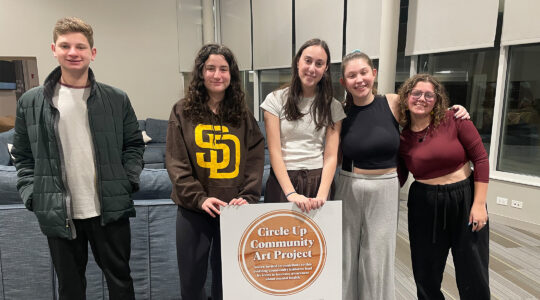WASHINGTON, Oct. 16 (JTA) — To find lax funding controls of Palestinian charities, one only need take a look at one of the Ford Foundation’s beneficiaries, the Palestinian Committee for the Protection of Human Rights and the Environment, also known as LAW. The group — whose acronym comes from the name of its predecessor activist organization, Land and Water — was a key organizer of the anti-Israel debacle at the September 2001 U.N. World Conference Against Racism in Durban, South Africa.
LAW received $9,628,942 during the five years ending Aug. 31, 2002, from a long list of philanthropic donors. Besides the Ford Foundation’s $1.1 million, LAW received direct grants from more than 30 European and American public entities.
These include $1.5 million from the Dutch charity Cordaid; $853,000 from the Grand Duchy of Luxembourg; more than $93,974 from the Swedish unit of Save the Children; and $33,000 from the Canadian Embassy, according to audits obtained for this investigation.
No Arab sources were listed in LAW’s five-year donor record.
Last fall, donors became concerned when LAW officials were unresponsive to spending inquiries, according to a newly installed senior LAW official. Soon it became clear to the donors that vast monies — more than $2 million — were unaccounted for, misappropriated or being secreted in bank accounts instead of being spent on programs.
A consortium of worried benefactors formed an evolving committee, made up mainly of Ford Foundation officials and Norwegian and Swiss donors, according to a source with the International Commission of Jurists in Sweden, one of the concerned donors.
The consortium wanted a major accounting firm to launch an immediate investigation and asked the Swedish relief agency SIDA to quickly commission an audit. SIDA enjoyed an ongoing contract with Ernst & Young, which accepted the assignment immediately.
Ernst & Young’s offices in Stockholm and the West Bank city of Ramallah then undertook the investigation, according to a SIDA spokeswoman.
Approximately 80 percent of the estimated $100,000 audit cost was to be reimbursed by Ford, in concert with several European charitable groups, she said.
SIDA’s spokeswoman explained her agency was not actually a LAW donor, but merely facilitated the audit as a convenience to Ford and other funders.
Ernst & Young headquarters in London refused to discuss any aspect of its audit or provide a copy of the investigative report, which was submitted to the donor consortium on March 25 of this year.
But a copy of the 60-page investigation, obtained from overseas sources, catalogs a stunning list of financial improprieties.
Nearly 40 percent of the $9.6 million donated was either ineligible, unsupported, misappropriated or never spent on programs, according to the investigative report.
And more than $2.3 million was “retained,” turning LAW into a sort of bank under the nominal control of its then-executive director, Khader Shkirat, and other senior officials, the report asserted.
Indeed, three interest-free loans were made to a moneychanger, Izz Shkirat, related to the executive director at the time, according to the report. Two of the three loans, $30,000 and $40,000, were repaid, the report stated.
But a May 1999 loan for $130,000 has yet to be repaid, according to the report.
More than $160,000 in expenses was paid on behalf of an entity called the Centre for Democratic Advancement, reportedly formed by Khader Shkirat, which then used the money to purchase a destroyed radio station, according to the audit.
Asked about media reports that LAW funds were embezzled, an American employee of Ernst & Young familiar with the audit replied, “It depends what dictionary you use. They were certainly misappropriated.”
Moreover, $490,000 from LAW became part of a series of transactions among other LAW board members and used to acquire a 56 percent ownership in Arab Phone Inc., according to the audit.
In addition, more than $75,000 was spent on first-class or business-class international airline tickets, and lavish hospitality, which added $109,000 to the impermissible expenses, according to the report.
Seven cars and trucks were purchased for personal use of several former board members, and several of the vehicles have remained with those former trustees, according to the report.
Ernst & Young also concluded that the unused money arose from “fictitious financial reporting” to donors as a result of “collusion” among LAW’s board, Khader Shkirat and local accountants.
In June of this year, CBS News interviewed Shkirat as attorney for Fatah leader Marwan Barghouti, who is being tried in Israel for terrorism.
The Ford Foundation recently granted Shkirat a $60,000 grant to conduct human rights research at Harvard and complete English courses at Boston University.
Shkirat could not be located for comment, and Ford officials refused all comment on the case.
While spotlighting LAW’s abuses, Ernst & Young also reported to donors that the foundations’ controls were so sloppy that “it cannot be ruled out that LAW was under the impression that it had the donor’s silent consent to use the funds in any way it saw fit.”
A key American Ernst & Young source familiar with the report denigrated the funding arrangements as “goulash.”
“Everything goes into the pot, everything goes out of the pot. No one knows what is what — not Ford, not any of them,” he explained.
A senior LAW executive added: “What do you expect? I know of one grant for $200,000 made from the European Commission with nothing more than a phone call.”
When reached, LAW’s new director, a Lebanese Canadian named Jihad Sarhan, apologized for LAW’s former management and said LAW would not engage in future agitation or name-calling, simply human rights advocacy.
Sarhan stated that he did not completely agree with the Ernst & Young report and was hoping to retain Price Waterhouse Coopers to conduct a follow-up audit. He added that the group appointed a new board, and in early August changed its name to Law Association for Human Rights.
LAW correspondence and submissions over recent months to Ford and other donors, obtained exclusively for this investigation, thanked international donors for continuing their financing and promised strict financial controls in the future.
As of this writing, Ford was still scheduled to continue its funding of LAW through 2005, according to LAW and Ford sources.
Edwin Black is the author of the newly released “War Against the Weak: Eugenics and America’s Campaign to Create a Master Race” (Four Walls Eight Windows), which investigates corporate philanthropic involvement in American and Nazi eugenics. In May 2003, he won the American Society of Journalists and Authors’ award for best book of the year for his previous book, “IBM and the Holocaust” (Crown Publishing, 2001).
FUNDING HATE Series
Part 1: Ford funded Durban activists
Part 2: Ford´s Mideast money trail
Part 3: U.S. worries about transparency
Part 4: Case study of a Ford grantee
JTA has documented Jewish history in real-time for over a century. Keep our journalism strong by joining us in supporting independent, award-winning reporting.





